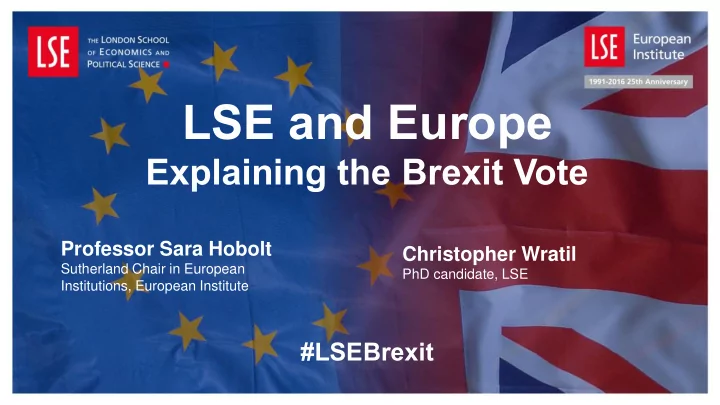

LSE and Europe Explaining the Brexit Vote Professor Sara Hobolt Christopher Wratil Sutherland Chair in European PhD candidate, LSE Institutions, European Institute #LSEBrexit
W HY D ID V OTERS C HOOSE B REXIT ? Prof Sara Hobolt & Christopher Wratil London School of Economics and Political Science
..I S B REXIT JUST THE BEGINNING ?
T HE EU REFERENDUM EXPERIENCE 50+ referendums on European integration Since 2000, there have been 25 EU referendums, of which 10 were No-votes • Denmark (x2), Sweden, Ireland (x2), Greece, France, the Netherlands (x2), and UK Political establishment + business normally overwhelmingly pro-EU
L ESSONS FROM PAST EU REFERENDUMS The campaign matters 1. Attitudes are highly malleable Messages from political parties are important 2. But parties often divided The “reversion point” is crucial 3. The consequences of a No-vote are as important as the proposal (Status Quo bias?) EU referendums are not just about the EU 4. Dissatisfaction with the government and anti- establishment protest votes
W HY THE R EMAIN - SIDE FELT CONFIDENT …. Do you think Britain would be better off or worse off economically if we left the EU? 40 37 35 30 26 25 22 % 20 15 15 10 5 0 Britain better off Britain worse off No difference Don't know Source: YouGov June 2016
T HE CAMPAIGN Close race Governing Conservative Party split, leading both camps Main issues: REMAIN: Economic dangers of Brexit ( A Leap in the Dark ) LEAVE: Immigration & Sovereignty ( Take Back Control ) No discussion about: democratic deficit, EU institutions
T HE CAMPAIGN ISSUES Note: Pre- referendum survey of 5,000 respondents asking for “main arguments” (structural topic model) (Hobolt & Wratil)
I MMIGRATION VS . E CONOMIC BENEFITS
‘P ROJECT F EAR ’ DID NOT WORK Fear- mongering ‘worked’ in Scottish referendum Survey experiment (May 2016): ‘Experts point out that the consequences of leaving / remaining in the European Union are very uncertain and difficult to predict…’ Telling respondents about uncertainty of Brexit : No effect Telling respondents about uncertainty of Remain : Less turnout Had people had enough of scare-mongering?
T HE L EAVE V OTER : C HARACTERISTICS Labour supporter Conservative supporter Populist attitudes Lack of trust in politicians British identity English identity European identity Income Education (less) Age -40 -30 -20 -10 0 10 20 Marginal effect (% change in Pr(Leave)) Source: Hobolt, 2016. BES. Marginal effect based on regression model of leave vote
E DUCATION GAP
T HE L EAVE V OTER : A RGUMENTS EU has not made UK more prosperous Brexit will not reduce trade UK Parliament to override EU law EU has not helped prevent war EU has undermined British identity Brexit will lower immigration Anti-EU migrants 0 5 10 15 20 25 30 Marginal effect (% change in Pr(Leave)) Source: Hobolt, 2016. BES. Marginal effect based on regression model of leave vote
% Net Remain support B UT IS B RITAIN AN O UTLIER ? -30 -20 -10 10 20 30 40 50 0 02/2012 Source: YouGov Euro Tracker. Question on referendum on EU membership – net Remain support. 04/2012 06/2012 08/2012 Denmark Britain 10/2012 12/2012 02/2013 04/2013 06/2013 08/2013 10/2013 12/2013 Sweden Germany 02/2014 04/2014 06/2014 08/2014 10/2014 12/2014 02/2015 04/2015 06/2015 Finland France 08/2015 10/2015 12/2015 02/2016 04/2016 06/2016 08/2016 10/2016
I TALY AND F RANCE ? Source: Bertelsmann Foundation
E XPLAINING SUPPORT FOR EU M EMBERSHIP Source: Bertelsmann Foundation, study of 8 EU countries. Marginal effects on support for remaining in the EU.
C ONCLUSION Referendum provided a mandate for Brexit, but not what kind of Brexit Government appears focused on limiting Freedom of Movement It is unlikely, but not impossible, that the Brexit vote will trigger other EU exits Yet, populist right-wing forces are on the rise across Europe Fuelled by anti-immigration, Eurosceptic and anti- elite sentiments Similar socio-economic divides as in Brexit vote
Recommend
More recommend